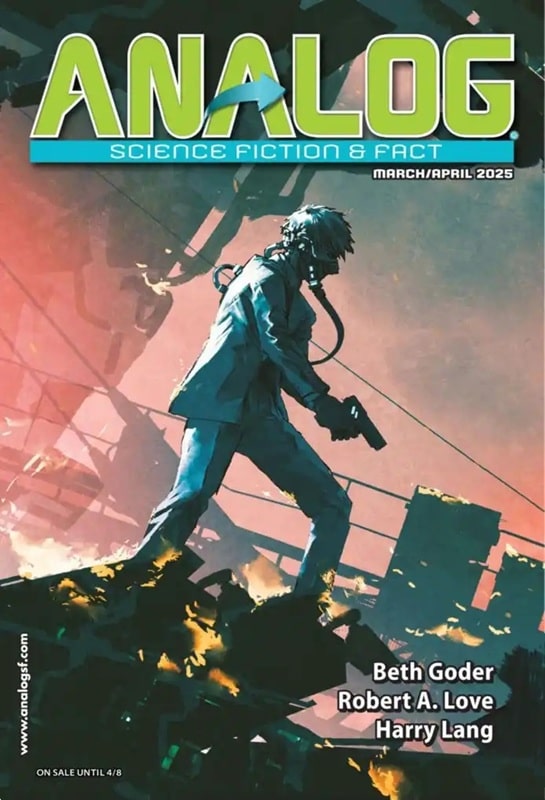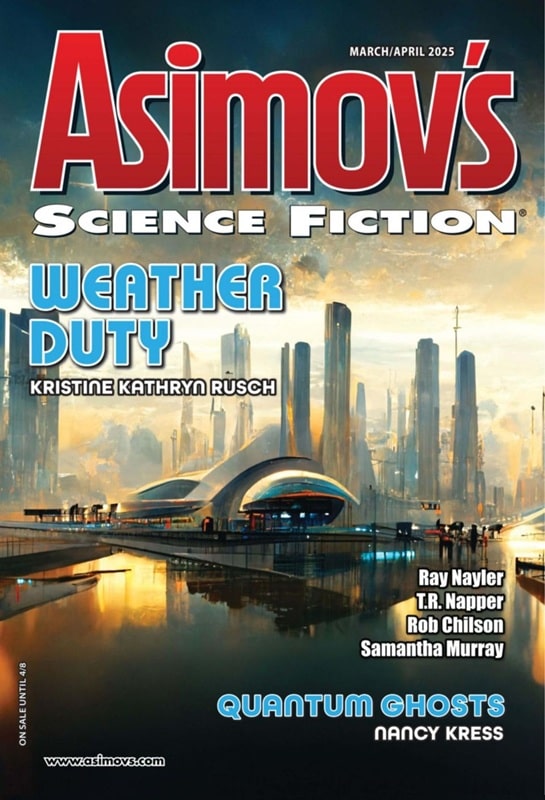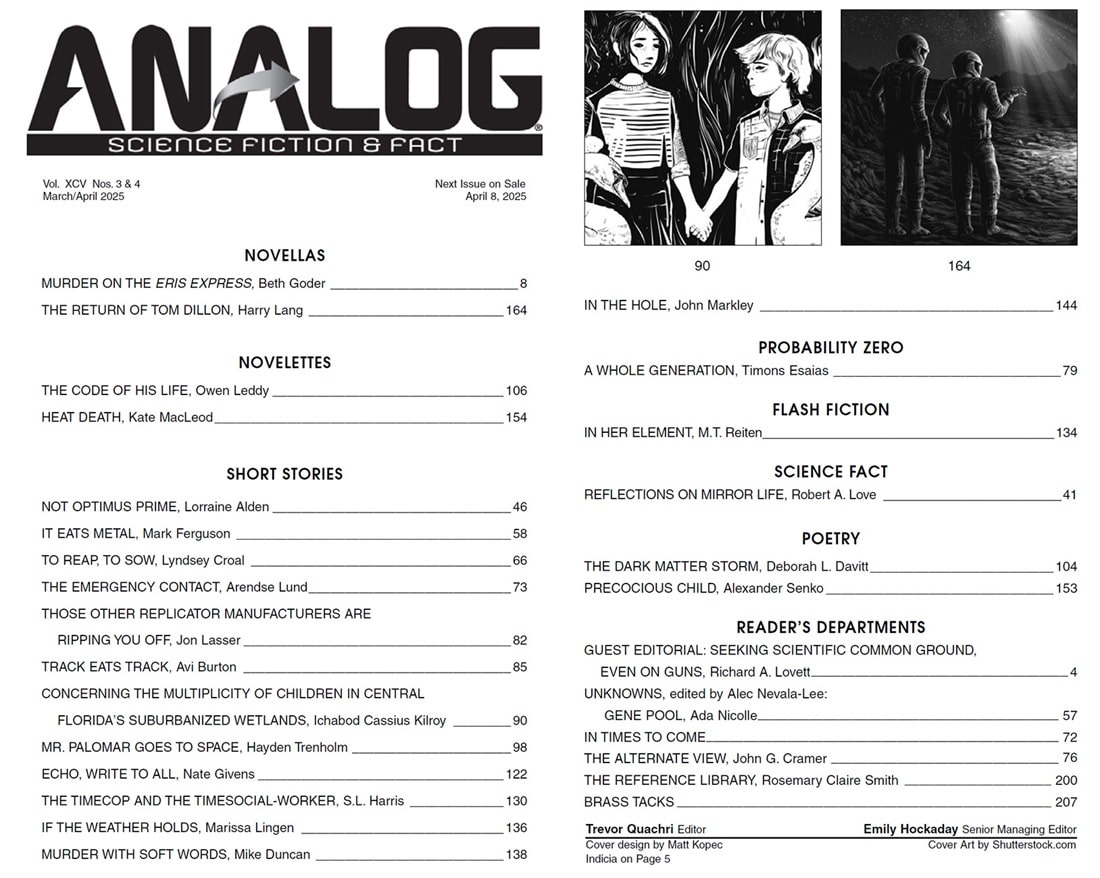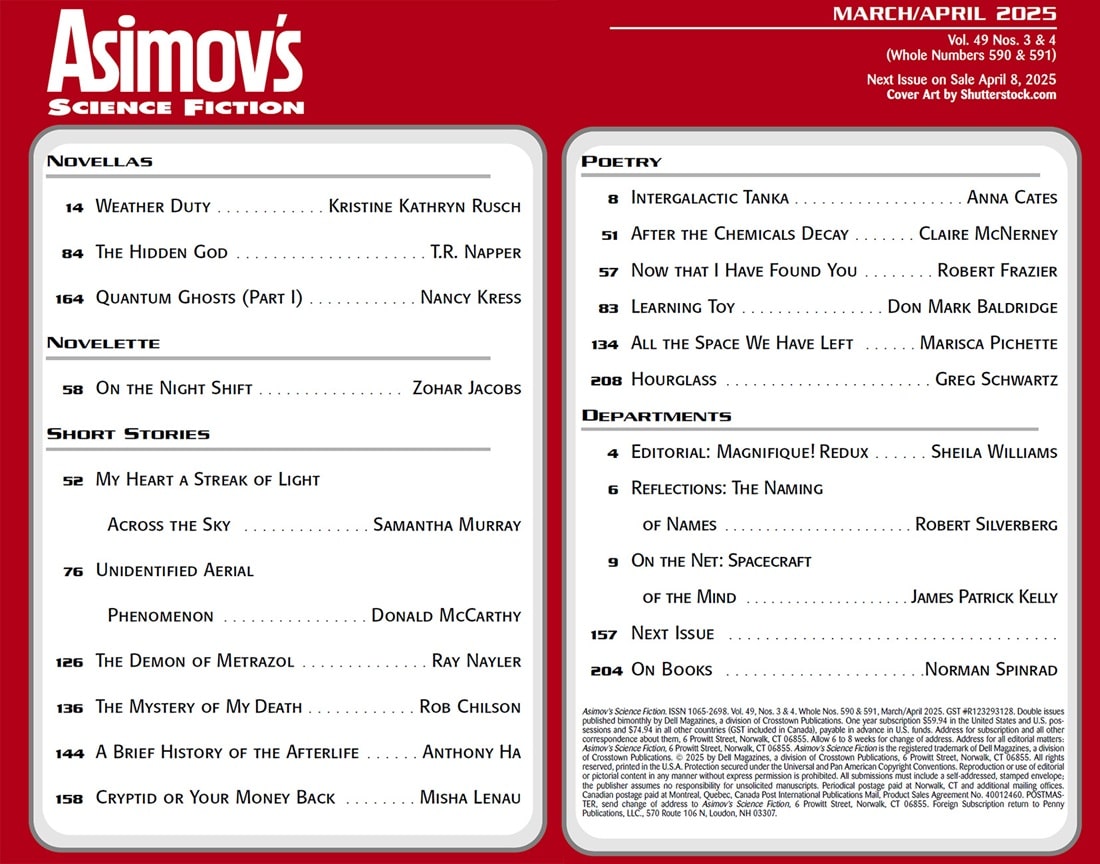Hidden Gods, Cryptids, and Swamp Monsters: March-April Science Fiction Magazines
 |
 |
March-April 2025 issues of Analog Science Fiction & Fact
and Asimov’s Science Fiction. Cover art by Shutterstock
The big news this month is that all three print science fiction magazines, as well as the mystery magazines owned by Penny Press, have been sold to a new buyer, a consortium of fans who have have ambitions to maintain and grow all five. Here’s an excerpt from the announcement at Locus Online.
Alfred Hitchcock’s Mystery Magazine, Analog Science Fiction and Fact, Asimov’s Science Fiction, Ellery Queen Mystery Magazine, and The Magazine of Fantasy & Science Fiction have been acquired by Must Read Magazines, a division of a new publishing company, Must Read Books Publishing. All editorial staff from the magazines have been retained in the acquisitions… Must Read Magazines is financially backed by a small group of genre fiction fans. A major investor and board advisor is Michael Khandelwal, the founder of a writing nonprofit and Virginia’s Mars Con toastmaster.
Read all the details, including quotes from Asimov’s editor Sheila Williams, Analog editor Trevor Quachri, and F&SF publisher Gordon Van Gelder, at Locus Online.
Tentatively, I’m willing to believe this is Good News. It makes sense to have all five magazines under one roof, and the recent collapse of F&SF‘s publishing schedule (only one magazine shipped last year) seemed to auger its imminent demise. Though change is rarely good with magazines, and Dell Magazines/Penny Press has been a stalwart home for Asimov’s and Analog for over three decades, since 1992, keeping the magazines healthy and alive through decades of turmoil in the magazine business.
But there’s certainly an argument to be made that the magazines could benefit from a change, and sharing a single home. I’ve seen no announcement on when F&SF will resume publication, and I eagerly await news of the first issues of Asimov’s and Analog from the new publisher, due next week (April 8). Fingers crossed the transition will be smooth.
In the meantime, we’ve got the last Dell Magazine issues of Asimov’s Science Fiction and Analog Science Fiction & Fact in hand, and they’re just as enticing as usual, with contributions from Kristine Kathryn Rusch, Nancy Kress, Marissa Lingen, Ray Nayler, T.R. Napper, Rob Chilson, Robert A. Love, Beth Goder, Anthony Ha, and many more.
Victoria Silverwolf at Tangent Online enjoyed in the latest Asimov’s.
“Weather Duty” by Kristine Kathryn Rusch takes place in the domed city of Las Vegas in a near future where citizens are required to spend time on government committees, analogous to jury duty. The main character serves on the committee that controls the weather. She and a local celebrity are attacked by thugs with high-tech weapons, for reasons that only become clear at the end.
This novella is effective as crime/suspense fiction and as a portrait of a possible future. The speculative technology and the way the government committees work are quite convincing, both in their advantages and their limitations. The protagonist, a dancer and choreographer, is a plausible action heroine, able to deal with a crisis in a believable fashion while remaining a realistic character with whom one can empathize.
“The Hidden God” by T. R. Napper alternates sections of narrative describing unpleasant and often deadly fates facing various rich and famous characters with sections dealing with a philosopher interacting with a highly advanced artificial intelligence. It soon becomes obvious that the powerful AI is attacking people whom it believes are causing enough harm to others that they should be rendered powerless or even killed. It turns out that there is an unexpected connection between the AI and the philosopher. Often as vivid and visceral as any blood-soaked thriller, this novella also raises the age-old issue of whether it is acceptable to help many by harming few. The author doesn’t pretend to solve this ancient dilemma, but uses it to delve into the character of the philosopher.
The drug mentioned in the title of “The Demon of Metrazol” by Ray Nayler is a real one, formerly used to treat mental patients by inducing violent convulsions. In the 1930’s, a woman works at a mental hospital by photographing patients before, during, and after these grim treatments. The patients always display extreme terror when the drug is administered. The story’s ending offers hints as to why this occurs. This is a subtle and unnerving horror story, using disturbing facts of the past to create a growing sense of fear.
The narrator of “The Mystery of My Death” by Rob Chilson is a time traveler who discovers his own grave in the future. He ponders exactly when he might die, goes on a mission to correct an error made in the recent past, and makes a major change in his life. Despite the title and a premise that might seem morbid, this is an upbeat, optimistic story that emphasizes life rather than death.
In “Cryptid or Your Money Back” by Misha Lenau, people can buy kits that allow them to remove their human bodies and become mythical creatures, then switch back whenever they please. The narrator becomes a chupacabra, the so-called goatsucker of Latin American folklore. Reluctant to return to human form, or to socialize with other people who have changed their bodies in this way, the narrator eventually discovers what is really desired.
Read Victoria’s complete review here.
The new Analog is reviewed by the ever reliable Sam Tomaino at SFRevu. Here’s a sample.
The new short fiction begins with the novella, “Murder on the Eris Express” by Beth Goder. Who killed Captain Jeremy on the Eris Express when the sensors of Mo, the ship’s AI were shut off? Mo, who always wanted to be a detective, investigates. Fun story to begin the issue!
“Not Optimus Prime” by Lorraine Alden. Vera is using a QR59 quantum computer to find a large prime number. She actually succeeds at that and something more, but the presence of a man delivering helium puts her in peril. Exciting story.
“It Eats Metal” by Mark Ferguson. Our narrator and his friends investigate a swamp where two students and a dog had disappeared and woman’s legs had been severely injured. What do they find? Nice mystery.
“Those Other Replicator Manufacturers Are Ripping You Off” by Jon Lasser. Some guidelines on getting replicators for your space ship. Amusing.
“Concerning the Multiplicity of Children in Central Florida’s Suburbanized Wetlands” by Ichabod Cassius Kilroy. Mori is almost nine years old and her brother, Orion, is almost five. Each morning she sees ghosts of their possible futures, some good, some bad. Interesting.
“The Code of His Life” by Owen Leddy. Ava and her friend, Alejandro, are in the grey market drug-hacking business. He is offered a job for a big legit firm and takes it. But when he drops dead, Ava knows he was murdered. She investigates and finds a way to have justice. Good story!
“Heat Death” by Kate McLeod. Detective Lidia is called in by her old friend, Chloe, to investigate a man who died of heat in the middle of the Texas desert. What she finds out is tragic. Poignant tale.
The fiction concludes with the novella, “The Return of Tom Dillon” by Harry Lang. This is a follow-up to the novelette, “Hothouse Orchids” by Harry Lang in the January/February 2023. Detective Hector Kovack returns to investigate another murder connected to the group behind the previous one. Does it have a connection to the return of an old friend working on a political campaign? Some good old hard-boiled detective stuff here. I hope I see more.
Yes, there was a crime theme to most of the stories of this issue, I almost thought I was reading Ellery Queen’s Mystery Magazine!
Read Sam’s full review here.
Here’s all the details on the latest SF print mags.
[Click the images for bigger versions.]

Analog Science Fiction & Science Fact
Editor Trevor Quachri gives us a tantalizing summary of the current issue online, as usual.
Normally, we think of the March/April issue as something of our “humor and hoaxes issue,” in keeping with the seasonal spirit of April Fool’s Day. This time, however, we’re focusing on another important day in April: Tax Day. Yes, the only things certain in life are death and taxes, and the bulk of our stories lie at the juncture where death and money meet: crime.
Our lead story from Beth Goder, “Murder on the Eris Express,” might evoke familiar images of a mustachioed Belgian on a train, but the parallels end at the title — I promise you’ve never seen a “detective” quite like this. And there are plenty more SF/crime pieces to accompany this one, including:
“The Return of Tom Dillon,” a sequel to Harry Lang’s excellent future noir, “Hothouse Orchids” [January/February 2023]; the opposite of a locked-room mystery, in “Heat Death,” by Kate MacLeod; the definition of a gambling problem, in John Markley’s “In the Hole”; and more.
Plus, of course, we have to include at least some lighter fare, such as “A Whole Generation” by Timons Esias and “Mr. Palomar Goes to Space” by Hayden Trenholm, just for starters, plus our fact article, “Reflections on Mirror Life,” by Robert A. Love — think biochemistry, not Star Trek — and all our regular columns, as well as maybe a surprise or two!
Here’s the full TOC.
Novellas
“Murder on The Eris Express,” Beth Goder
“The Return of Tom Dillon,” Harry Lang
Novelettes
“The Code of His Life,” Owen Leddy
“Heat Death,” Kate MacLeod
Short Stories
“Not Optimus Prime,” Lorraine Alden
“Ti Eats Metal,” Mark Ferguson
“To Reap, To Sow,” Lyndsey Croal
“The Emergency Contact,” Arendse Lund
“Those Other Replicator Manufacturers Are Ripping You Off,” Jon Lasser
“Track Eats Track,” Avi Burton
“Concerning the Multiplicity of Children in Central Florida’s Suburbanized Wetlands,” Ichabod Cassius Kilroy
“Palomar Goes to Space,” Hayden Trenholm
“Echo, Write to All,” Nate Givens
“The Timecop and the Timesocial-worker,” S.L. Harris
“If the Weather Holds,” Marissa Lingen
“Murder With Soft Words,” Mike Duncan
“In the Hole,” John Markley
Probability Zero
“A Whole Generation,” Timons Esaias
Flash Fiction
In Her Element, M.t. Reiten
Science Fact
Reflections On Mirror Life, Robert A. Love
Poetry
The Dark Matter Storm, Deborah L. Davitt
Precocious Child, Alexander Senko
Reader’s Departments
Guest Editorial: Seeking Scientific Common Ground, Even On Guns, Richard A. Lovett
In Times To Come
The Alternate View, John G. Cramer
The Reference Library, Rosemary Claire Smith
Brass Tacks

Asimov’s Science Fiction
Sheila Williams provides a handy summary of the latest issue of Asimov’s at the website.
Our March/April 2025 issue is bursting with fiction. We have three exciting novellas stuffed into our pages. Kristine Kathryn Rusch opens the issue with a thrilling story about “Weather Duty”; T.R. Napper brings us an intense tale about a rogue AI in “The Hidden God”; and Nancy Kress bookends the issue with Part 1 of a giant novella that exposes the terrifying consequences of coexistence with “Quantum Ghosts”!
Ray Nayler reveals the true horror behind “The Demon of Metrazol”; Rob Chilson attempts to resolve “The Mystery of My Death”; new author Anthony Ha gives us “A Brief History of the Afterlife”; new to Asimov’s author Samantha Murray spins the bittersweet tale of “My Heart a Streak of Light Across the Sky”; and new author Donald McCarthy shocks us with truths about “Unidentified Aerial Phenomenon.” Zohar Jacobs returns to our pages with a tense story about what it means to be “On the Night Shift,” and Misha Lenau makes good on the promise of “Cryptid or Your Money Back.”
Robert Silverberg’s Reflections explains “The Naming of Names”; James Patrick Kelly’s On the Net considers “Spaceships of the Mind”; and Norman Spinrad’s On Books muses about “Speculative Literature?” Plus we’ll have an array of poetry you’re sure to enjoy.
Here’s the complete Table of Contents.
Novellas
“Weather Duty” by Kristine Kathryn Rusch
“The Hidden God” by T.R. Napper
“Quantum Ghosts” (Part I) by Nancy Kress
Novelette
“On the Night Shift” by Zohar Jacobs
Short Stories
“My Heart a Streak of Light Across the Sky” by Samantha Murray
“Unidentified Aerial Phenomenon” by Donald McCarthy
“The Demon of Metrazol” by Ray Nayler
“The Mystery of My Death” by Rob Chilson
“A Brief History of the Afterlife” by Anthony Ha
“Cryptid or Your Money Back” by Misha Lenau
Poetry
Intergalactic Tanka by Anna Cates
After the Chemicals Decay by Claire McNerney
Now that I Have Found You by Robert Frazier
Learning Toy by Don Mark Baldridge
All the Space We Have Left by Marisca Pichette
Hourglass by Greg Schwartz
Departments
Editorial: Magnifique! Redux by Sheila Williams
Reflections: The Naming of Names by Robert Silverberg
On the Net: Spacecraft of the Mind by James Patrick Kelly
Next Issue
On Books by Norman Spinrad
Analog, Asimov’s Science Fiction and The Magazine of Fantasy & Science Fiction are available wherever magazines are sold, and at various online outlets. Buy single issues and subscriptions at the links below.
Asimov’s Science Fiction (208 pages, $8.99 per issue, one year sub $47.97 in the US) — edited by Sheila Williams
Analog Science Fiction and Fact (208 pages, $8.99 per issue, one year sub $47.97 in the US) — edited by Trevor Quachri
The Magazine of Fantasy & Science Fiction (256 pages, $10.99 per issue, one year sub $65.94 in the US) — edited by Sheree Renée Thomas
The March-April issues of Asimov’s and Analog were on sale until April 8. See our coverage of the January-February issues here, and all our recent magazine coverage here.
Was waiting for this article. I’d picked up copies of those magazines, but they’re sitting on my peninsula, untouched yet, because I wanted a better synopsis than the covers give.
Thanks for this coverage!
Glad you find it useful, K.
No need to wait for my synopsis, though. Have you checked out any of the sites that regularly review short fiction, like TANGENT ONLINE, SFREvu, or Locus Online? They all include pretty lively coverage, including a lot of great digital mags.
Black Gate so faithfully publishes these curated synopses, though! ^_^
Been a little burnt by online magazines about science fiction and fantasy, in the past decade, so haven’t been as inclined to read them. I’ll try them again. Thank you for the waypoint.